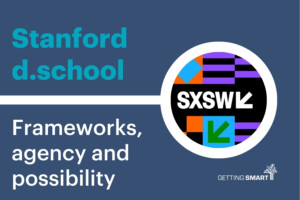Moving from Inputs to Outputs to Outcomes
In a new report, Michael Horn and Katherine Mackey cover some old ground and some new ground. They outline 7 Digital Learning Now aligned policy recommendations:
• Pay online providers not just for serving children, but also for student performance.
• Reward not just for output-based performance—as in, when a student completes a course—but for real learning outcomes independently verified.
• Reward operators for individual student growth that takes into account formative and summative assessments.
• Allow students to demonstrate competency through assessments, portfolios, or other means anytime they complete a course, not just at limited fixed times throughout the year.
• Eliminate input-based rules, such as student-to-teacher-ratios, seat-time, and teacher- certification requirements.
• Give school operators control over their budgets and allow them to have significantly more freedom in how they allocate dollars.
• Ensure the proper infrastructure—Internet access and Internet-access devices—is in place.
Horn and Mackey tackle the quality question, “Until this shift to an outcomes-based policy occurs, we suspect states will continue some regulation of inputs to attempt to monitor quality.”
Like iNACOL’s Susan Patrick, Horn and Mackey makes elimination of seat time a policy priority, “The real opportunity in the shift to online learning—be it in distance or, increasingly more frequently, blended environments*—is to move beyond the country’s current factory-model system where seat time, an input measure, is used as the overriding metric that governs funding flows and so forth.
The EdWeek review incorrectly labels the piece an update on ‘online learning policy.’ Horn and Mackey clearly intend the policy recommendations for the whole of American education. It’s interesting that Katie Ash picks up on certification, “Clamoring to nix seat-time isn’t new, but doing away with teacher certification altogether isn’t something I’ve heard a lot of talk about.” Here’s the specific Digital Learning Now recommendation:
Educators should be prepared for specific roles – traditional, blended or online – and then certified based on demonstrated performance. Performance-based certification will become increasingly important as the number and type of roles for learning professionals expands.
Moving from Inputs to Outputs to Outcomes: The Future of Education Policy is worth a read and a board study session.








Karl Wheatley
The key to education reform is more authoritarianism?
Wouldn't a more distinctly American approach begin with freedom and bottom-up reform?
Too many of the people who like top-down reform either don't understand kids or teachers or the dynamics in the trenches or are looking to sell something, and as with the Reading First debacle.
Replies
Anonymous
Karl, I hear you but there is some policy responsibility when a vital public delivery system doesn't produce the desired results. The policy response doesn't need to be authoritarian, it can also be a shift in incentives or the introduction of multiple providers.
One exciting recent development is viral adoption of free/cheap tools with network effects (ie, they get better as the crowd gets bigger). This is helping to empower teacher leaders.
mattwbowman
Karl, I think we need people at the top to break their own monopoly. Replacing seat-time requirements with competency-based requirements and (limited) national standards could take the federal gov't out of operations, where it stinks, and create incentives for Silicon Valley, Wall Street and local entrepreneurs to aim their firehouse of talent and money at education.
Replies
Anonymous
interesting to think about a competency marketplace within systems that have incentives to build/support rapid pathways to mastery